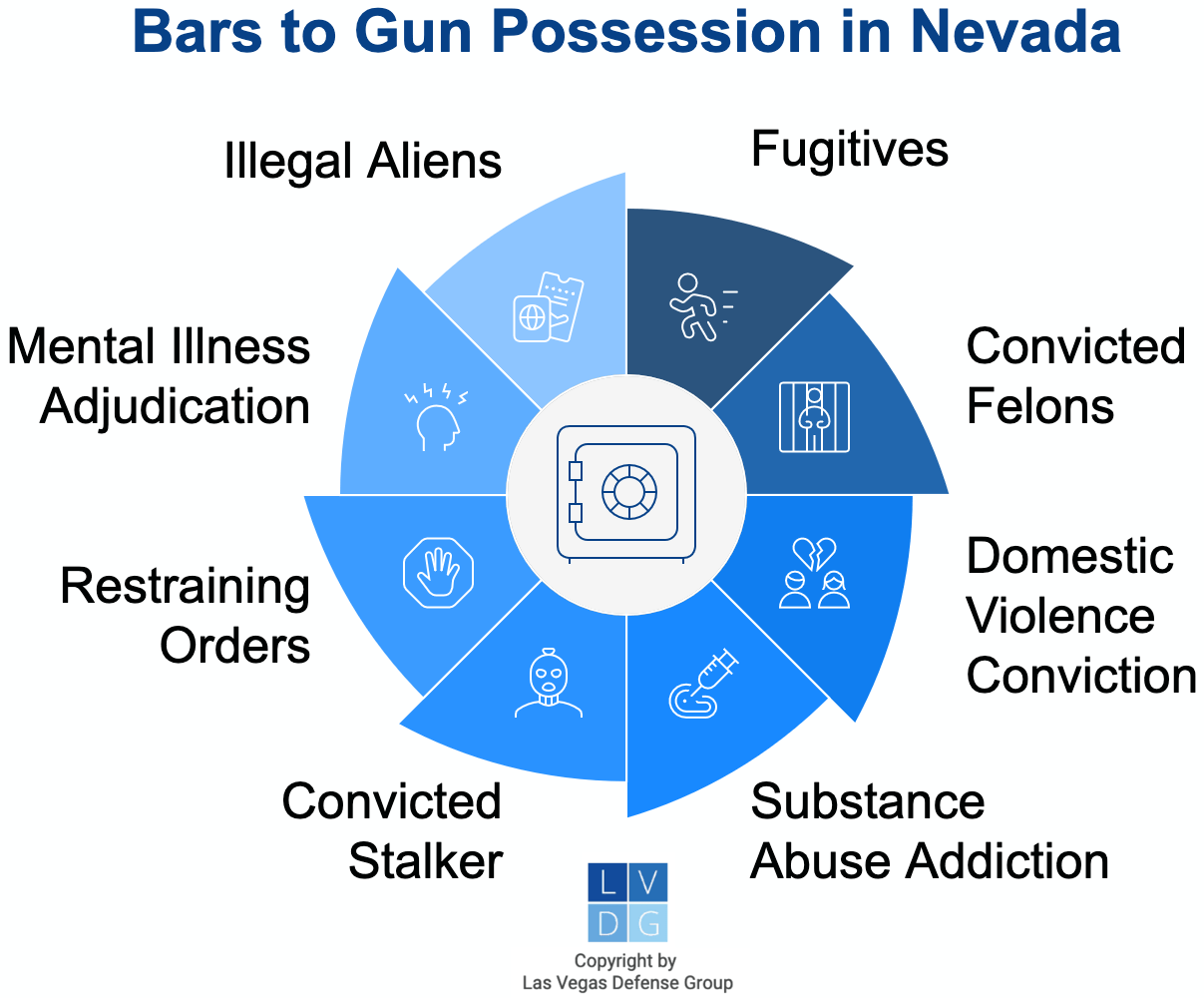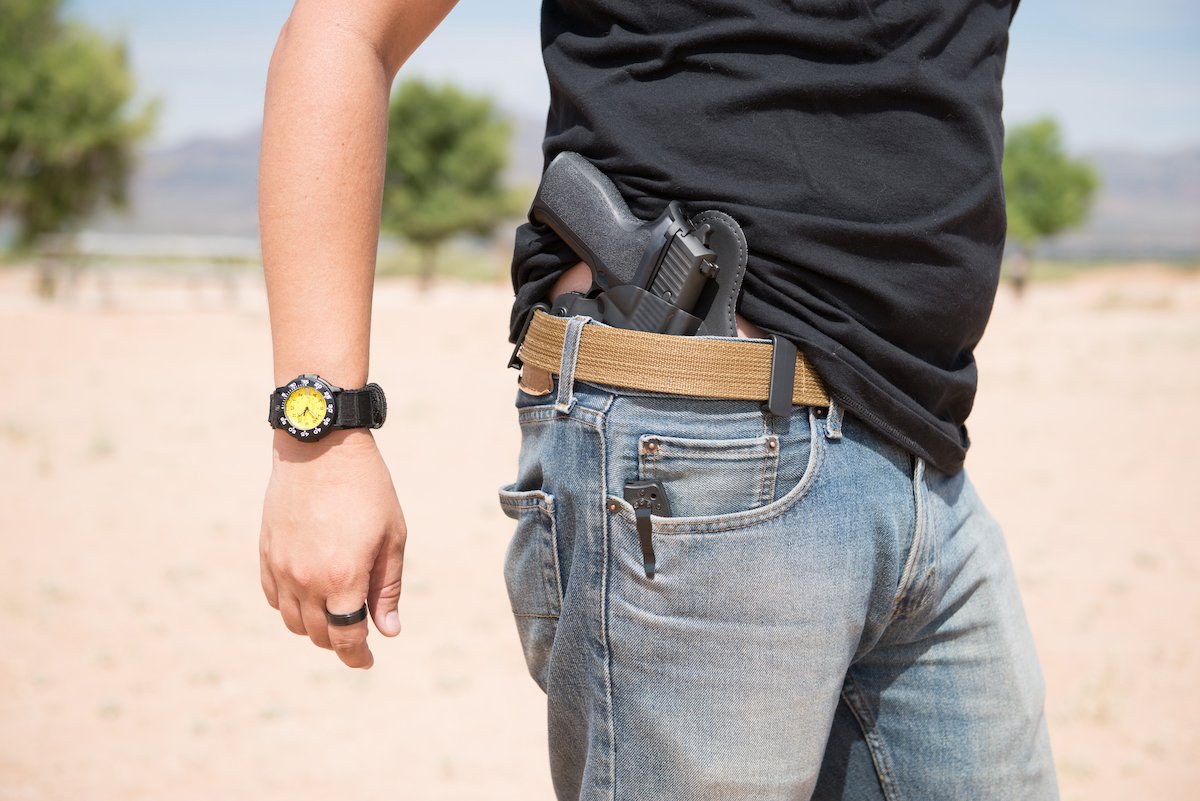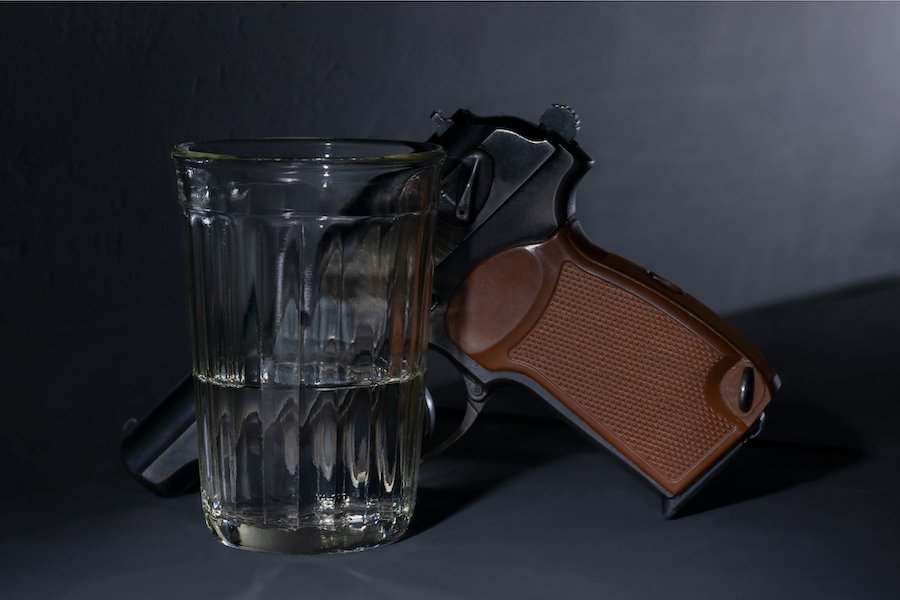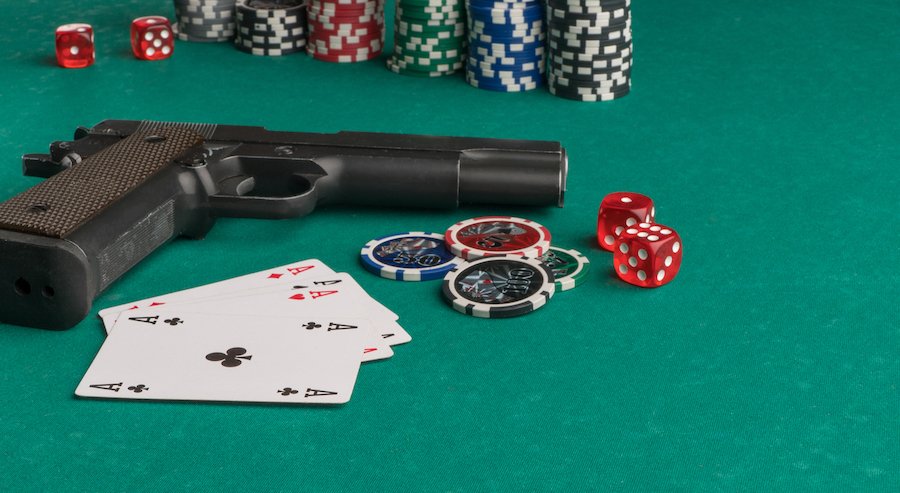Nevada gun laws apply to both in-state and out-of-state residents. Penalties for violating these laws can be very serious, so it is important you familiarize yourself with the rules before bringing in any guns.

Open Carry Laws
You are permitted to “open-carry” firearms in Nevada, with certain limitations, whether you are an in-state or out-of-state resident.
Open carry means the gun is “discernible by ordinary observation.” This can include:
- a holstered handgun on a belt
- a rifle sling
- “Virginia Tuck,” which is using an “inside the waistband holster” where the pistol butt is visible
- “Mexican Carry,” which is tucking the gun in the waistband without a holster
In contrast, it is not open carry to cover a gun with a jacket or other clothing.
Conceal Carry Laws
Since Nevada is not a ‘Constitutional Carry’ state, you may not carry a concealed firearm without a current and valid CCW permit. Therefore if you are a non-Nevada resident, you can carry a concealed weapon if you have a CCW from a reciprocal state or from Nevada.1
Carrying concealed firearms without a concealed carry permit (NRS 202.350) is a category C felony with a penalty of:
- 1 to 5 years in Nevada State Prison and
- Up to $10,000.2
If you move to Nevada, you must obtain a Nevada state permit within 60 days in order to continue carrying concealed. You should apply at your local county sheriff’s office once you get your Nevada driver’s license. (New Las Vegas residents would apply with the Las Vegas Metropolitan Police Department.)3
Note that you must always have your CCW and state-issued ID with you if you are carrying concealed. You must also present them to a police officer if they request it; otherwise, you have no duty to inform police you are carrying if they do not ask.
Where Guns Are Prohibited in Nevada
The open carry of firearms is largely allowed under Nevada state law. However, the following locations are off-limits to long guns, revolvers, and pistols:
- Federal facilities
- Post offices
- Military bases (with a few exceptions)
- VA facilities
- Legislative buildings
- Planes and airports beyond the secure areas (if you are transporting guns, they must be unloaded, cased, and locked)
- Nevada System of Higher Education property (without written permission)
- Public and charter schools (without written permission)
- Childcare facilities (without written permission)
- Any federal or state facility with “no firearms” signs posted and with metal detectors at the entrances
- Hoover Dam4
It does not matter whether the guns are visible or concealed.

Unlawfully carrying a gun in Nevada is a felony.
Who Cannot Have Guns in Nevada
Whether you live in Nevada or not, you are barred from possessing or owning firearms in Nevada if:
- You are a fugitive;
- You are a convicted felon;
- You have been convicted of domestic violence;
- You are addicted to controlled substances;
- You are a convicted stalker;
- You are an adverse party in a domestic violence restraining order;
- You have been adjudicated mentally ill or have been committed; or
- You are an illegal alien.5
Being an ex-felon, fugitive, or drug addict in “possession of a firearm” is a category B felony. The sentence is:
- 1 to 6 years in prison and
- Up to $5,000.
The maximum prison sentence is reduced to four years if you are:
- Mentally ill or
- An undocumented alien.6

Nevada requires background checks to purchase firearms.
Background Checks to Buy a Gun
You must pass a background check to buy a gun in Nevada. It does not matter whether it is a:
- Commercial sale or
- Private gun sale.
However, if you have a current and valid CCW permit, you should be able to skip the background check.7
Gun Laws for Juveniles
In general, minors under 18 may not carry guns in Nevada. There are certain exceptions where minors may have guns for hunting purposes.
Learn more about Nevada juvenile carry laws.8

It is unlawful in Nevada to carry a firearm while drunk or high.
Carrying While Under the Influence
It is a Nevada misdemeanor to possess a gun while impaired by drugs or alcohol or if you have a blood alcohol concentration of 0.08% or higher. Therefore, it is best to keep your guns at home if you intend to drink while out at a restaurant, bar, or elsewhere.
Misdemeanors carry up to six months in jail and/or up to $1,000 in fines.9
Assault Weapons in Nevada
I get a lot of questions about assault weapons, but Nevada law actually makes no mention of them.
However, federal law prohibits machine gun possession. The only exception is if it was lawfully obtained and registered before May 19, 1986.
Unlawful possession of a machine gun is a felony. The penalty is:
- Up to 10 years in federal prison and/or
- Up to $250,000.
Bump stocks are now also unlawful in Nevada. This ban was prompted by the Mandalay Bay Harvest Festival shooting on October 1, 2017.10

Open carry is largely lawful in Nevada.
Related Articles
For more information on Nevada gun laws, refer to these articles by our Las Vegas criminal defense attorneys:
- Changing gun serial numbers (NRS 202.277)
- Setting a spring gun (NRS 202.255)
- Assault with a deadly weapon (NRS 200.471(2)(b))
Additional Reading
For more in-depth information, refer to these scholarly articles:
- What’s Going Wrong in Nevada? A Comparative Analysis of California and Nevada Gun Control Laws as They Relate to Gun Violence – Claremont McKenna thesis
- State gun laws and the movement of crime guns between states – International Review of Law and Economics
- Guns in the Sky: Nevada’s Firearm Laws, 1 October, and Next Steps – Nevada Law Journal forum
- In-State and Interstate Associations Between Gun Shows and Firearm Deaths and Injuries – Annals of Internal Medicine
- The relation between state gun laws and the incidence and severity of mass public shootings in the United States, 1976–2018 – Law and Human Behavior
Legal References
- Reciprocity List, Nevada Department of Public Safety (2025); see also NRS 202.3657. Note that the following states are “constitutional carry,” which means you do not need a CCW permit at all as long as you are otherwise allowed to have a gun: Alabama, Alaska, Arizona, Arkansas, Florida, Georgia, Idaho, Indiana, Iowa, Kansas, Kentucky, Maine, Missouri, Montana, Nebraska, New Hampshire, North Dakota, South Dakota, Tennessee, Texas, Utah, Vermont, West Virginia, and Wyoming. Nevada does not recognize CCW permits from the following states: Alabama, California, Colorado, Connecticut, Delaware, Georgia, Hawaii, Indiana, Iowa, Maine, Maryland, Missouri, New Hampshire, New Jersey, New York, Oregon, Pennsylvania, Rhode Island, Vermont and Washington.
- NRS 202.350; see also Nevada Attorney General Opinion No. 93-14. People allowed to have guns may keep guns in glove boxes without a CCW permit.
- NRS 202.3688. Note that Nevada is a shall-issue state.
- NRS 202.265; 18 U.S.C. 930; 43 CFR 423.30; Nevada state law has preemption over local laws, but local authorities can regulate the discharge of firearms. The Second Amendment protects the right to bear arms for security, hunting, recreational use, and other lawful purposes.
- NRS 202.360; see also 18 U.S.C. 922; see also State v. Fourth Judicial Dist. Court of Nev. (2021) 481 P.3d 848, 137 Nev. Adv. Rep. 4; see also Pohlabel v. State (2012) 128 Nev. 1, 268 P.3d 1264, 128 Nev. Adv. Rep. 1.
- NRS 202.360.
- NRS 202.2547 et seq. (Background Check Act, passed by the Nevada Legislature in 2019).
- NRS 202.300.
- NRS 202.257.
- 18 USC § 921 et seq.


